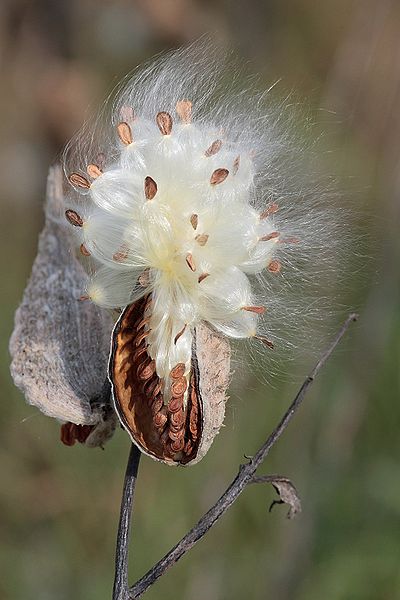I have been trying to grow milkweeds on my property for the past fourteen years. I have some milkweeds with whitish flowers, and some with pink flowers.
When I first moved here, the Milkweeds were small and very few, they were about ten inches high and scrawny. A neighbor, in Chicago, had credited me with the first monarch butterflies he had seen in years. So I pulled out my squirreled away milkweed seeds, saved from my Chicago plants. They were tall ones, three to maybe five feet tall.
I wanted to bring that out here. This is the country; it should have been easy to grow wildflowers, right? Well, not really. When the farmers spray the fields in the spring I lost the majority of the milkweeds. A few survived growing next to some trees or protected by tall grass. Each year they made the attempt to grow taller and stronger. Until finally had a patch in the front, near the drainage pond. Last year, that area flooded and the milkweeds sat in deep water for over a month and everything turned black and molded.
This year I had a small patch closer to the driveway. I watched it all summer. The plants grew between three and five feet tall. Even when they started to die down, the stalks stood straight and held onto the seed pods.
I was expecting to grab a couple of seed pods, like I do every year, and save them in the garage until spring. Two days ago, the seeds burst out of their pods, in a puff of pure white, sparkly, silky blur. The small flat brown seeds were connected like tiny parachutes waiting for the winds to catch them. For a moment, serenely, they held on to their pods, narcissistically I assumed they were waiting for me to notice them.
I did a double take when I walked out to get the mail. Surrounded by a variety of browns and dried dark greens, and sitting on those splotchy dried stalks the pods had burst into view. At first glance, I thought I was looking at snow perched on the end of a branch.
I have to admit, second and third glances they still looked like snowballs.
I waded through the dried grass to get a closer look. At that moment, a slight breeze made a wish and the seeds drifted around and above me, the seeds littered the grass, and wafting along on each breeze.
My first thought, “The Monarchs will love this.” Then I remembered that sometimes the farmers use Bt insecticides their crops, not very beneficial to Monarchs.
We live in a world of chemicals, electromagnetic radiation; poison rain,… the list can be endless. All this makes me wonder how one person, not pouring chemicals into the land can help? Help will come when we start to love the so called, weeds again and stop being afraid. Fear is a reaction to things we don’t understand.
I wonder if I make a wish with one of these seed pods, like a child when holding up dandelion that has gone to seed and wish for ,…What would you wish for?
This site has a description of what, Bacillus thuringiensis (Bt) corn pollen is;
“Colorado State University”
http://www.ext.colostate.edu/pubs/crops/00707.html
Here is some information from the, University of Illinois Extension, Illinois Pesticide Review;
http://web.extension.uiuc.edu/ipr/i4188_829.html
“Bacillus thuringiensis (Bt) is a bacteria that occurs naturally in the soil. It produces an endotoxin crystal that attacks the gut membrane and creates pores, which cause leakage and swelling. The swelling continues until cells burst, which allows the gut contents to leak into the insect’s blood, disrupting the blood pH and resulting in paralysis and death within 24 to 72 hours. In Bt corn, the genes in the bacteria that code for the production of this endotoxin crystal are inserted through genetic engineering into the corn plant. The resulting corn plants produce the endotoxin crystal, causing the death of caterpillars that feed on them. This toxin is produced in many locations of the corn plant, including the pollen.”
Picture of Milkweed-
http://en.wikipedia.org/wiki/File:Milkweed-in-seed2.jpg
